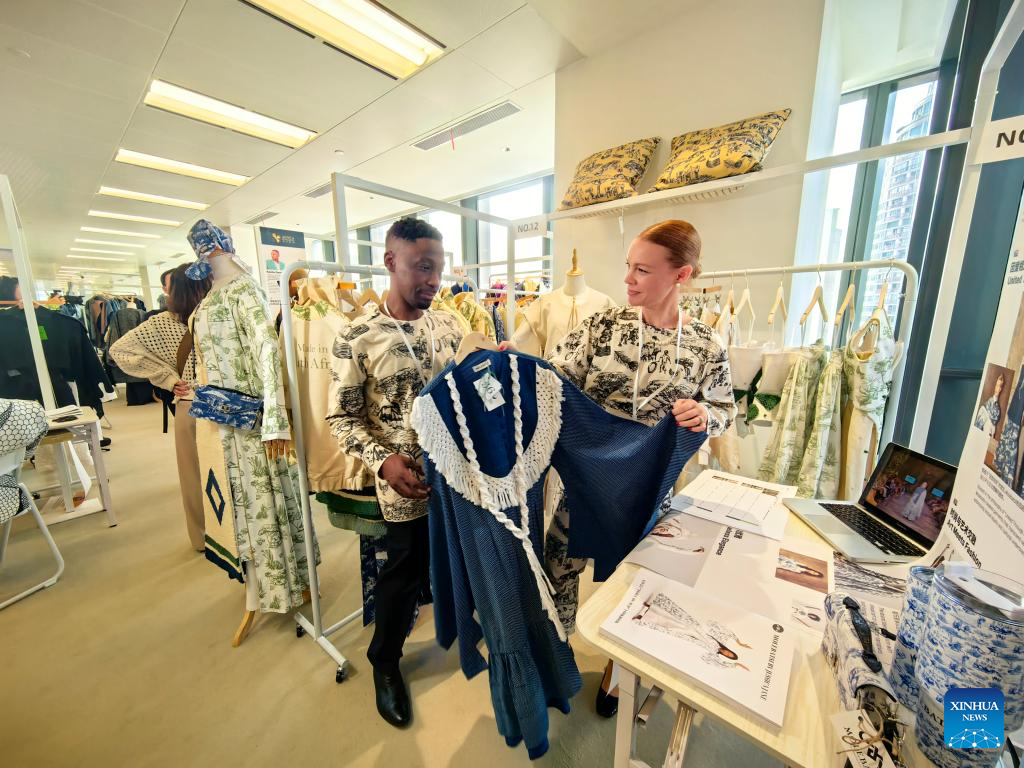
 0 Comment(s)
0 Comment(s) Print
Print E-mail Xinhua, April 3, 2025
E-mail Xinhua, April 3, 2025

South African designer Jessica Jane (R) and her husband, Wandile Molebatsi, co-founders of South African fashion brand Molebatsi, display their collections at the trade exhibition MODE during Shanghai Fashion Week in east China's Shanghai, March 25, 2025. [PhotoXinhua]
At the ongoing 2025 Autumn/Winter Shanghai Fashion Week, 22 African fashion brands made their debut, aiming to break into the Chinese and broader Asian markets while highlighting the appeal of China's burgeoning "debut economy."
Models walked the runway in Shanghai, presenting the latest collections from African designer brands, from handmade weaving to natural dyeing and environmentally friendly techniques.
Themed "Innovascape," the fashion extravaganza took place from March 25 to April 1, showcasing nearly 100 runway shows and about 1,000 brands in exhibitions.
Hannah Ryder, CEO of Development Reimagined, brought 22 African designer brands from 12 countries to Shanghai Fashion Week, giving them the opportunity to connect with global buyers and retailers at the trade exhibition MODE.
"This is the first time that African designers have come to China as a group, and I think our main message for the Chinese market is that African fashion brands are ready to enter China," said Ryder, noting that African designer brands have immense potential in terms of creativity and sustainability and can offer something truly unique to the Chinese market.
"Shanghai Fashion Week is one of the top fashion weeks in the world," Ryder said, adding that this is not only an opportunity to showcase African creativity and culture but also an excellent chance to establish connections and expand business cooperation with the Chinese fashion industry, and even the rest of Asia, including Southeast Asia, Japan and the Republic of Korea.
She noted that while African clothing is often associated with beautiful patterns and vibrant colors, African designer brands feature a much more diverse range of design languages and aesthetics.
Ryder explained that while some of the brands have already entered the European market, they are still new to China and will use the exhibition and runway shows to introduce themselves, alongside launching select new collections on Chinese e-commerce platforms as a "test drive."
A Chinese-style buckle and double-breasted design, featuring cuffs inspired by Hanfu yet reimagined with African geometric patterns, is paired with fabric adorned with scenes of local South African tribes. This striking ensemble is one of the latest creations from the South African fashion brand Molebatsi.
South African designer Jessica Jane and her husband, Wandile Molebatsi, co-founded the brand. In 2023, Jane made a special trip to central China's Hunan Province to attend the China-Africa Economic and Trade Expo, followed by a visit to Beijing.
During her 10-day trip to China, Jane saw traditional Chinese clothing, such as Hanfu and horse-faced skirts, for the first time. "China's long history and traditional culture fascinated me," she said. After the trip, she began brainstorming ways to combine elements of traditional Chinese clothing with traditional African clothing, ultimately bringing the new products back to China.
"It's an incredibly exciting opportunity because there are so many collaborations and mutually beneficial relationships between Africa and China," said Wandile Molebatsi. "There's a huge amount of opportunity for Africans here in China, and it's very exciting."
Aristide Loua, from Cote d'Ivoire, is new to the Chinese market. Through pre-promotion activities at Shanghai Fashion Week, he received cooperation invitations and engaged in in-depth negotiations with numerous buyers. "I will formulate a plan for entering the Chinese market based on their feedback," Loua said.
"As we witness African designers showcasing their work at one of the world's most influential fashion weeks, we are taking an essential step toward a more inclusive and diverse global fashion industry. Through continued collaboration, investment, and market access, African brands can carve out their space in the Chinese market -- not as a niche, but as a mainstream force," said Phuti Tsipa, Consul General of South Africa in Shanghai.
Raphael Deray, a buyer from Printemps in Paris, went straight from the airport to the MODE exhibition to meet with designers from China, Africa, Japan, the Republic of Korea, and other places.
"My expectations are quite high to find good designers and good products during Shanghai Fashion Week because I know China has a lot of potential. It is a big market for fashion," Raphael Deray said.
"As a trendsetter in the Asian fashion industry, Shanghai Fashion Week is an amplifier of innovative fashion. We will create a gateway for international brands to engage with the Chinese market through a more open and inclusive approach and foster a new fashion ecosystem that spans from Chinese design to global resonance," said Tong Jisheng, director of the Shanghai Fashion Week organizing committee.
Recently, the "debut economy" has emerged as a key driver of consumption in China. This concept encompasses product launches, flagship store openings, new service rollouts, and the development of innovative business models and technologies.
Liu Min, deputy director of the Shanghai Municipal Commission of Commerce, said that the "debut economy" is an important measure to expand domestic demand and boost consumption.
Shanghai has enhanced policy support across multiple areas, including exhibition support, streamlined customs clearance, and financial incentives. These measures have further optimized the launch environment for global new products and provided stronger service guarantees for both domestic and international brands introducing new products in the city.
"We hope more brands will establish a long-term presence in Shanghai, starting with a first launch or debut show, followed by the opening of flagship stores, and ultimately establishing headquarters here to expand globally," she added.
Go to Forum >>0 Comment(s)